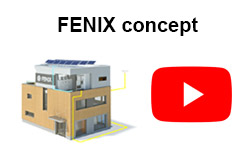We pay for electricity like we’re back in the 1990s.

European energy policies and the effects of war will hit exporters very hard. According to Cyril Svozil, the owner of Fenix Group, Europe could become uncompetitive.
"I see this as the biggest risk. I don´t think it is directly connected with the war, but the war is accelerating this whole thing in some way," C. Svozil says, adding that exporters who are not able to cover the increased costs through pricing will have only two options: "Either move production somewhere else, or close it down, because their products won´t be accepted in the world," C. Svozil explains.
Mr C. Svozil himself wants to fight expensive energy with a new energy centre. "This year we are going to invest about eighty million crowns in a new energy centre at our production plant. We are building large photovoltaic power plants, large hydroelectric power plants and large battery storage facilities. We will trade actively on the spot market," C. Svozil says.
It is an unpleasant situation. We immediately calculated what it meant for us. This year, it will be between 50 and 60 million crowns. Ukraine was a bigger market for us than Russia. What is very unpleasant, though, is the fact that we have completed a special order for Ekaterinburg for defrosting components. It has been left just lying here, and I´m afraid that it will be very difficult to repeat. We grew by dozens of per cent in Ukraine.
You said that Ukraine is the larger market, what contracts did you have there?
These were no special contracts. It was a residential market that was developing there very dynamically, and we supplied our heating systems. It was a huge, growing market. We grew by dozens of per cent over the previous four years.
And why were you successful in Ukraine?
Firstly, it is because they have quite a lot of electricity, and on top of that zero-emission electricity, as a large share is from nuclear power. Heavy industry has declined there, and electricity was cheap and affordable.
And how are you generally doing with the heating systems and battery storage you are selling? Has interest increased now with regard to growing energy prices?
It is true that the energy market has gone crazy. Especially in Europe, where it isn´t a result of the war but of very bad decisions in energy policy in recent years. Particularly in Germany.
This has led to an unprecedented escalation in energy prices in Europe. The highest prices weren´t at the beginning of the war, but already at the end of last year. However, when speaking about energy prices, it is citizens who are affected the most.
And it is also industry…
Not just industry. Those who process, produce, finish off something. It can be agriculture or services. And when these prices make themselves felt in the products - fortunately, this hasn´t happened yet, as 80 per cent of users run in some type of fixed mode according to the latest statistics – the impact will be serious. It will be reflected in the final prices of practically everything. I think that protecting those vulnerable groups is like a dog chasing its tail. We will start creating such groups by increasing the price of food and basic products, because companies will use them to cover the rise in energy prices. The second, very unfortunate outcome of this development is that exporters will be affected very strongly because they won´t be able to cover it by raising prices. They will have two options then. Either transfer production somewhere else, or close it down, because their products won´t be acceptable in the world.
So you mean that Europe could lose its competitiveness?
That´s exactly what I´m afraid of. I see this as the biggest risk. I don´t think it´s directly related to the war, but the war is accelerating it in a certain way. It is an issue that is really threatening, and if we don´t react (and react quickly), it can happen. And we will need to deal with problems which we haven´t had to deal with for the last decade – such as mass unemployment, and so on. We will actively trade on the spot market.
You said that the solution will be to take production and move it out of Europe. Are you really considering something like that?
No, we’re not. We have a different method of handling this. This year we have invested about eighty million crowns in a new energy centre at our production plant. We are building large photovoltaic power plants, large hydro power plants and large battery storage systems. We will actively trade on the spot market. This is where costs can be reduced radically.
So you´ll become a trader on the spot market? When?
Exactly, from the New Year. Our prices will be fixed until the end of the year, and so we have time to prepare for it. From the New Year, we will have no other choice but to go this way.
How big a player are you going to be?
We won´t be a big player. We will play only for ourselves. There are two other large production plants on our premises. We want to connect with them and offer them the same position. The combination of photovoltaic systems, hydro power plants and a large battery storage facility will enable us to get electricity on the spot market just at low tariffs and, during the high one, we will use batteries where energy will be stored, or use what is produced by the photovoltaic systems and hydro power plants. We are even able, and we have verified it during periods with the highest tariff, to supply electricity to the grid and, again, reduce our own operating costs.
Is the project ready yet?
We´re finishing it now. It is a more or less new development necessitated by the dramatic increase in energy prices. We came up with the Fenix energy complex five years ago, and we are dealing with this issue comprehensively – both in the home and at the production plant – by producing, using and utilising electricity as efficiently as possible. We already offer this, and the battery storage facility is an integral part of this solution.
The rise in energy prices made us think about trading. Even end users can do it these days. There are traders who offer a spot mode in energy trading. And so even a small user can operate on the daily electricity market for a fee. If they are equipped with devices and technologies which are able to filter low prices, and not use the highest ones, then they can also reduce their costs.
So, going back to my original question from the beginning of our interview, what is the interest in your technologies of this kind now?
It has been increasing enormously. While the rise in prices caused a lot of uncertainty with regard to heating systems, and people are postponing their decisions in this matter, everyone knows that energy won´t be as cheap as it used to be, and everybody is now very interested in these comprehensive solutions. That is, to be able to produce some of the energy yourself, to be able to manage it and have equipment which can also do the trading for you. Just to give you an idea, we launched the pilot operation of a system in a house where we supply electricity to the network at the highest tariff. In 17 days we reached an average price of 0.8 CZK per kWh. The price is like it was in the 1990s.
Only 0.8 CZK?
Yes, it´s a significant reduction, it is basically like in the 1990s. Previously, we operated only in the cheap purchase and good utilisation mode, and we were at 1.6 CZK, but by selling selectively in the period of the highest tariff, we got to 0.8 CZK.
You say that interest is enormous now. Who are the customers?
All of the battery storage facilities have been developed by us. We started with small battery storage facilities for the residential sector. Then we made great progress cooperating with Škoda Auto, when we decided to use their battery systems, preparing for "Second Life". At the end of eight years of car battery operation, when batteries have to be exchanged, we are able to sort them, after which they can be used for further 15 years. This is a huge economic and ecological advantage. Today, we have a residential storage facility with a capacity of 41 kWh. We have also developed a system for smaller companies or shopping centres. It has a capacity of up to 350 kWh, and we can also do this for production plants. For example, at our production plant we launched a storage facility of 640 kWh. And there is huge interest in this now.
So how many customers already have it?
These industrial contracts are contracts for tens of millions. We already have 15 applications, and ten are being made this year. This is peak capacity for us - we aren´t able to make more under these conditions. But now, of course, we are going to invest a lot in the development of the whole concept. In the case of the smaller systems, we lost a bit of time by switching to "Second Life batteries"- software is being developed there – and we are doing this in cooperation with CTU – but we assume that software will be available from April that will allow users of this storage system to trade on the daily electricity market, which will mean a huge explosion of interest.
Today we already sell what we produce immediately. I think that once those results are published and verified, it will mean a huge change. This year, we want to sell only on the Czech and Slovak markets, for logical reasons – it is a complicated and complex device that needs more service than our current products. From next year, we´ll start selling these products in all nine of the countries where we have a presence.
So this is the future of your company?
Yes, certainly. I´m convinced that in the next five years, this concept will become overwhelmingly prevalent in our activities.
Cyril Svozil
20.04.2022






